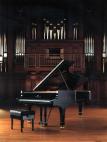Piano culture: Singaporeans are so musically inclined!
 If we start gathering statistics on the number of Singaporeans who have 'officially' learnt piano, I am quite sure that the statistics will be rather impressive. In Singapore, learning piano is part of the culture among a sizable portion of the middle-class! So the question I've been asking myself is: are Singaporeans really so musically inclined? Do we really have so many aspiring Melvyn Tan's? Do we truly love piano music so much?
If we start gathering statistics on the number of Singaporeans who have 'officially' learnt piano, I am quite sure that the statistics will be rather impressive. In Singapore, learning piano is part of the culture among a sizable portion of the middle-class! So the question I've been asking myself is: are Singaporeans really so musically inclined? Do we really have so many aspiring Melvyn Tan's? Do we truly love piano music so much?From what I've observed over the years, in Singapore, piano learners are not really learning the instrument out of true love for it. Most of the learners are really young when their parents find piano teachers for them, and many of them seriously wish to give up this time-consuming 'extra-curricular activity' when they reach their teenage years, when their schoolwork gets more harrowing and their interest in the instrument wanes. Unfortunately, these parents do not really care whether their children like the piano or not. In fact, they don't care at all! But they will still force their children to go through this ritual for several reasons.
Firstly, many of them have not had the chance to learn the piano when they were young. Chinese cultures all over the world are like that: the older generation will always try to make the younger generation do what they had wanted to do in their time but did not get the chance to. Secondly, the piano is an instrument with 'class', so learning it confers some of the associated prestige to the family that has a child learning it, regardless of the reason for learning it or the actual capabilities of the 'pianist within the family'. Parents are usually quite proud when their kids practise the piano, since the neighbours can certainly hear the piano music which is quite loud compared to the music produced by other instruments. Even if the guitar were to have equal prestige as piano, people will probably still choose piano, because the latter can be heard much more clearly and thus the family does not need to go out of the way to 'advertise' that fact to the neighbours. It is not 'music' that the family-with-piano prizes, but the 'face' or 'mianzi' that this activity confers that it is attempting to gain...
But parents are not entirely to be blamed. Another reason why I think that piano learners in Singapore are not truly passionate about piano is that they can't be! The piano-education system here is flawed, for it mirrors the education system in general in terms of its exam focus. In Singapore, the ultimate credentials-focused society in the world, piano learning has mutated from a leisurely activity done out of musical appreciation into a stressful activity done out of the motivation to collect yet another certificate. Someone I know once told me that the reason why he wants his children to learn piano is that they can have an additional skill to make a living if the economy is not doing well. Gosh!
The focus is on passing exams of one grade after another, all the way to Grade 8 or even Diploma (LTCL, ARCM, etc). With this kind of focus, it's not surprising that the child's love for the music is eventually knocked out by the boring exam pieces, the 'scales', and other exercises that the child has to master in order to pass the exams. The compulsory Baroque piece that one has to play at every grade (for example, J.S. Bach, Haydn, Handel, etc) is usually not melodious at all, and certainly a great pain to practise (unfortunately, the two other pieces of different genres are usually not the nicest-sounding pieces in the world either, unless one is extremely lucky). And having to practise two to three uninspiring and not-exactly-melodious pieces daily after many tiring hours at school can really drive a teenager crazy.
It's also hard to find a stimulating piano teacher in Singapore. Many are teaching piano for the money, not out of real love for imparting this art to the children. Of course, they are probably also disillusioned after seeing so many disinterested children who have been 'forced' to learn the piano by their parents. How many will actually teach beyond the exam syllabus of the Associated Board of the Royal Schools of Music (ABRSM)? Not many will, I reckon. And it's not surprising because I would do the same too if I were in their situation, having to face the pragmatic parents who will scream should their precious and obviously 'talented' child fail the exam ("What?! I'm paying you so much money every month and he can't even pass his exam?? Then why are you wasting his time by teaching him these pieces which are not in 'the syllabus'?!").
Thus, the piano culture in Singapore is warped. It's parents-driven, exams-focused, and certificate-oriented. Perhaps parents should seriously consider thrice before insisting that their children learn the instrument, or let the children decide for themselves when they are older (say, 11-12 years old). It's really a heavy commitment in terms of finances, time, and energy. It may be cool to boast to your friends that your child can play the piano, but if you really think about it, despite the tens of thousands of dollars spent on learning the instrument, how many people with the Grade 8 certificate actually do continue playing it when they have crossed all the hurdles? Isn't it a waste to learn the piano if one stops playing it immediately after passing all the exams? Isn't it silly to play nothing but the exam pieces for 10 years of one's piano education? This reflects a mentality that is antithetical to the spirit of music learning. Somehow, I feel that Singapore's culture of pragmatism is so pervasive that no area of activity is spared. So the piano, despite all its beauty, similarly denegerates and mutates into a torturous tool for social comparison, prestige enhancement, authoritarian exercise of parental power, and credentialling for an uncertain economy. Which is sad, really......

